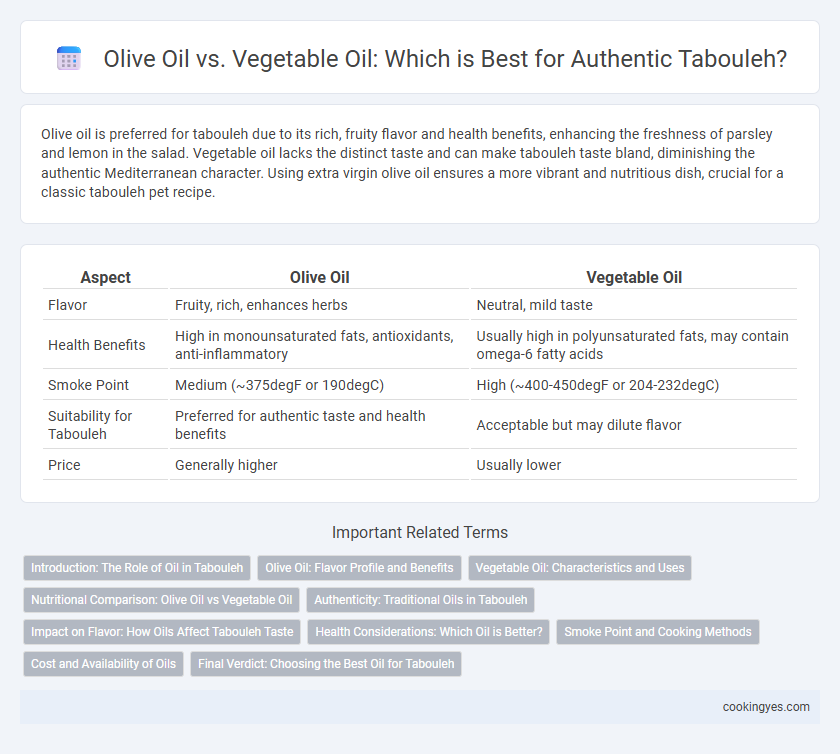Olive oil is preferred for tabouleh due to its rich, fruity flavor and health benefits, enhancing the freshness of parsley and lemon in the salad. Vegetable oil lacks the distinct taste and can make tabouleh taste bland, diminishing the authentic Mediterranean character. Using extra virgin olive oil ensures a more vibrant and nutritious dish, crucial for a classic tabouleh pet recipe.
Table of Comparison
| Aspect | Olive Oil | Vegetable Oil |
|---|---|---|
| Flavor | Fruity, rich, enhances herbs | Neutral, mild taste |
| Health Benefits | High in monounsaturated fats, antioxidants, anti-inflammatory | Usually high in polyunsaturated fats, may contain omega-6 fatty acids |
| Smoke Point | Medium (~375degF or 190degC) | High (~400-450degF or 204-232degC) |
| Suitability for Tabouleh | Preferred for authentic taste and health benefits | Acceptable but may dilute flavor |
| Price | Generally higher | Usually lower |
Introduction: The Role of Oil in Tabouleh
Olive oil is essential in tabouleh for its rich, fruity flavor and health benefits, enhancing the dish's freshness and nutritional profile with antioxidants and healthy monounsaturated fats. Vegetable oil offers a more neutral taste but lacks the robust aroma and health advantages that olive oil provides. Choosing the right oil affects the authenticity and overall sensory experience of traditional tabouleh.
Olive Oil: Flavor Profile and Benefits
Olive oil enhances tabouleh with its rich, fruity flavor and slightly peppery undertones, complementing the fresh herbs and lemon juice perfectly. Rich in antioxidants and healthy monounsaturated fats, olive oil supports heart health and reduces inflammation, making it a nutritious choice for the classic Middle Eastern salad. Its natural aroma and smooth texture elevate the overall taste and authenticity of tabouleh compared to the neutral, less flavorful vegetable oil.
Vegetable Oil: Characteristics and Uses
Vegetable oil, known for its neutral flavor and light texture, allows the fresh herbs and lemon juice in Tabouleh to shine without overpowering the dish. Its high smoke point makes it suitable for various cooking methods, but in Tabouleh, it primarily adds moisture and a subtle richness without masking the salad's vibrant ingredients. Unlike olive oil, vegetable oil lacks the distinctive fruity and peppery notes, making it a versatile but less traditional choice for authentic Tabouleh preparation.
Nutritional Comparison: Olive Oil vs Vegetable Oil
Olive oil offers higher levels of monounsaturated fats and antioxidants such as vitamin E and polyphenols, which contribute to heart health and anti-inflammatory benefits in tabouleh. Vegetable oil, often derived from soybeans, corn, or sunflower, contains a higher amount of omega-6 polyunsaturated fats but fewer antioxidants, potentially promoting inflammation if consumed excessively. Using extra virgin olive oil enhances the nutritional profile of tabouleh by providing beneficial fatty acids and bioactive compounds that are absent or minimal in most vegetable oils.
Authenticity: Traditional Oils in Tabouleh
Olive oil is the traditional and authentic choice for Tabouleh, contributing a rich, fruity flavor and enhancing the dish's Mediterranean heritage. Vegetable oil lacks the distinctive aroma and depth that olive oil provides, making it less favorable in maintaining the salad's genuine taste profile. Using extra virgin olive oil preserves the authentic texture and nutritional benefits essential to classic Tabouleh recipes.
Impact on Flavor: How Oils Affect Tabouleh Taste
Olive oil imparts a rich, fruity, and slightly peppery flavor that enhances the fresh herbs and lemon juice in Tabouleh, creating a more authentic and vibrant taste. Vegetable oil, being neutral and bland, masks the herbaceous notes and results in a less distinctive and flat flavor profile. The choice of olive oil over vegetable oil significantly elevates Tabouleh's overall taste by adding depth and enhancing the salad's traditional Mediterranean character.
Health Considerations: Which Oil is Better?
Olive oil is considered healthier for tabouleh due to its high content of monounsaturated fats and antioxidants like vitamin E and polyphenols, which support heart health and reduce inflammation. Vegetable oils often contain higher levels of omega-6 fatty acids, which in excess can promote inflammation. Choosing extra virgin olive oil enhances the nutritional profile and authentic flavor of tabouleh while providing cardiovascular benefits.
Smoke Point and Cooking Methods
Olive oil, with a smoke point around 375degF (190degC), is ideal for dressings and low-heat applications in tabouleh, preserving its rich flavor and health benefits. Vegetable oil, having a higher smoke point near 400-450degF (204-232degC), suits cooking methods requiring heat but may dilute the traditional taste of the dish. For authentic tabouleh, cold preparation favors olive oil to maintain nutritional value and enhance the herbaceous freshness.
Cost and Availability of Oils
Olive oil, known for its rich flavor and health benefits, tends to be more expensive and less readily available in some regions compared to vegetable oil. Vegetable oil offers a more cost-effective option and is widely accessible in most grocery stores, making it a practical choice for preparing tabouleh on a budget. While olive oil enhances the dish's authenticity and taste, vegetable oil provides a convenient and economical alternative without compromising the overall texture.
Final Verdict: Choosing the Best Oil for Tabouleh
Olive oil offers a robust, fruity flavor that complements the fresh, zesty ingredients in tabouleh, enhancing its authentic Mediterranean taste and providing healthy monounsaturated fats and antioxidants. Vegetable oil, often neutral in flavor and higher in omega-6 fatty acids, may dilute the dish's vibrant profile and offer less nutritional benefit compared to extra virgin olive oil. For the best tabouleh experience, extra virgin olive oil is the ideal choice, balancing superior taste with health advantages.
Olive Oil vs Vegetable Oil for Tabouleh Infographic

 cookingyes.com
cookingyes.com